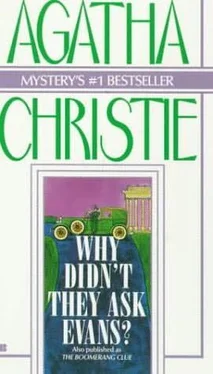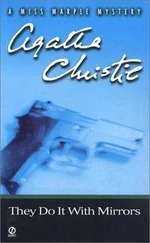Agatha Christie - Why Didn't They Ask Evans
Здесь есть возможность читать онлайн «Agatha Christie - Why Didn't They Ask Evans» весь текст электронной книги совершенно бесплатно (целиком полную версию без сокращений). В некоторых случаях можно слушать аудио, скачать через торрент в формате fb2 и присутствует краткое содержание. Жанр: Классический детектив, на английском языке. Описание произведения, (предисловие) а так же отзывы посетителей доступны на портале библиотеки ЛибКат.
- Название:Why Didn't They Ask Evans
- Автор:
- Жанр:
- Год:неизвестен
- ISBN:нет данных
- Рейтинг книги:2.5 / 5. Голосов: 4
-
Избранное:Добавить в избранное
- Отзывы:
-
Ваша оценка:
- 60
- 1
- 2
- 3
- 4
- 5
Why Didn't They Ask Evans: краткое содержание, описание и аннотация
Предлагаем к чтению аннотацию, описание, краткое содержание или предисловие (зависит от того, что написал сам автор книги «Why Didn't They Ask Evans»). Если вы не нашли необходимую информацию о книге — напишите в комментариях, мы постараемся отыскать её.
Why Didn't They Ask Evans — читать онлайн бесплатно полную книгу (весь текст) целиком
Ниже представлен текст книги, разбитый по страницам. Система сохранения места последней прочитанной страницы, позволяет с удобством читать онлайн бесплатно книгу «Why Didn't They Ask Evans», без необходимости каждый раз заново искать на чём Вы остановились. Поставьте закладку, и сможете в любой момент перейти на страницу, на которой закончили чтение.
Интервал:
Закладка:
No. 17 had a board up announcing that it was to be sold or let unfurnished.
Frankie immediately removed the pince-nez and the earnest air.
It seemed that the political canvasser would not be required.
The names of several house agents were given. Frankie selected two and wrote them down. Then, having determined on her plan of campaign, she proceeded to put it into action.
The first agents were Messrs. Gordon & Porter of Praed Street.
'Good morning,' said Frankie. 'I wonder if you can give me the address of a Mr Cayman? He was until recently at 17 St Leonard's Gardens.' 'That's right,' said the young man to whom Frankie had addressed herself. 'Only there a short time, though, wasn't he?
We act for the owners, you see. Mr Cayman took it on a quarterly tenancy as he might have to take up a post abroad any moment. I believe he's actually done so.' 'Then you haven't got his address?' 'I'm afraid not. He settled up with us and that was all.' 'But he must have had some address originally when he took the house.' 'A hotel - I think it was the G.W.R., Paddington Station, you know.' 'References,' suggested Frankie.
'He paid the quarter's rent in advance and a deposit to cover the electric light and gas.' 'Oh!' said Frankie, feeling despairing.
She saw the young man looking rather curiously at her.
House agents are adepts at summing up the 'class' of clients.
He obviously found Frankie's interest in the Caymans rather unexpected.
'He owes me a good deal of money,' said Frankie mendaciously.
The young man's face immediately assumed a shocked expression.
Thoroughly sympathetic with beauty in distress, he hunted up files of correspondence and did all he could, but no trace of Mr Cayman's present or late abode could be found.
Frankie thanked him and departed. She took a taxi to the next firm of house agents. She wasted no time in repeating the process. The first agents were the ones who had let Cayman the house. These people would be merely concerned to let it again on behalf of the owner. Frankie asked for an order to view.
This time, to counteract the expression of surprise that she saw appear on the clerk's face, she explained that she wanted a cheap property to open as a hostel for girls. The surprised expression disappeared, and Frankie emerged with the key of 17 Leonard's Gardens, the keys of two more 'properties' which she had no wish to see, and an order to view yet a fourth.
It was a bit of luck, Frankie thought, that the clerk had not wished to accompany her, but perhaps they only did that when it was a question of a furnished tenancy.
The musty smell of a closed-up house assailed Frankie's nostrils as she unlocked and pushed open the front door of No. 17.
It was an unappetising house, cheaply decorated, and with blistered, dirty paint. Frankie went over it methodically from garret to basement. The house had not been cleaned up on departure. There were bits of string, old newspapers and some odd nails and tools. But of personal matter, Frankie could not find so much as the scrap of a tom-up letter.
The only thing that struck her as having a possible significance was an ABC railway guide which lay open on one of the window seats. There was nothing to indicate that any of the names of the open page were of special significance, but Frankie copied the lot down in a little note-book as a poor substitute for all she had hoped to find.
As far as tracing the Caymans was concerned, she had drawn a blank.
She consoled herself with the reflection that this was only to be expected. If Mr and Mrs Cayman were associated with the wrong side of the law they would take particularly good care that no one should be able to trace them. It was at least a kind of negative confirmatory evidence.
Still Frankie felt definitely disappointed as she handed back the keys to the house agents and uttered mendacious statements as to communicating with them in a few days.
She walked down towards the Park feeling rather depressed and wondered what on earth she was going to do next. These fruitless meditations were interrupted by a sharp and violent squall of rain. No taxi was in sight and Frankie hurriedly preserved a favourite hat by hurrying into the tube which was close at hand. She took a ticket to Piccadilly Circus and bought a couple of papers at the bookstall.
When she had entered the train - almost empty at this time of day - she resolutely banished thoughts of the vexing problem and, opening her paper, strove to concentrate her attention on its contents.
She read desultory snippets here and there.
Number of road deaths. Mysterious disappearance of a schoolgirl. Lady Peterhampton's party at Claridge's. Sir John Milkington's convalescence after his accident yachting - the Astradora - the famous yacht which had belonged to the late Mr John Savage, the millionaire. Was she an unlucky boat?
The man who had designed her had met with a tragic death Mr Savage had committed suicide - Sir John Milkington had just escaped death by a miracle.
Frankie lowered the paper, frowning in an effort of remembrance.
Twice before, the name of Mr John Savage had been mentioned - once by Sylvia Bassington-ffrench when she was speaking of Alan Carstairs, and once by Bobby when he was repeating the conversation he had had with Mrs Rivington.
Alan Carstairs had been a friend of John Savage's. Mrs Rivington had had a vague idea that Carstairs' presence in England had something to do with the death of Savage. Savage had - what was it? - he had committed suicide because he thought he had cancer.
Supposing - supposing Alan Carstairs had not been satisfied with the account of his friend's death. Supposing he had come over to inquire into the whole thing? Supposing that here, in the circumstances surrounding Savage's death - was the first act of the drama that she and Bobby were acting in.
'It's possible,' thought Frankie. 'Yes, it's possible.' She thought deeply, wondering how best to attack this new phase of the matter. She had no idea as to who had been John Savage's friends or intimates.
Then an idea struck her - his will. If there had been something suspicious about the way he met his death, his will would give a possible clue.
Somewhere in London, Frankie knew, was a place where you went and read wills if you paid a shilling. But she couldn't remember where it was.
The train drew up at a station and Frankie saw that it was the British Museum. She had overshot Oxford Circus, where she meant to have changed, by two stations.
She jumped up and left the train. As she emerged into the street an idea came to her. Five minutes' walk brought her to the office of Messrs. Spragge, Spragge, Jenkinson & Spragge.
Frankie was received with deference and was at once ushered into the private fastness of Mr Spragge, the senior member of the firm.
Mr Spragge was exceedingly genial. He had a rich mellow persuasive voice which his aristocratic clients had found extremely soothing when they had come to him to be extricated from some mess. It was rumoured that Mr Spragge knew more discreditable secrets about noble families than any other man in London.
'This is a pleasure indeed. Lady Frances,' said Mr Spragge.
'Do sit down. Now are you sure that chair is quite comfortable?
Yes, yes. The weather is very delightful just now, is it not? A St Martin's summer. And how is Lord Marchington? Well, I trust?' Frankie answered these and other inquiries in a suitable manner.
Then Mr Spragge removed his pince-nez from his nose and became more definitely the legal guide and adviser.
'And now. Lady Frances,' he said. 'What is it gives me the pleasure of seeing you in my - hm - dingy office this afternoon?' 'Blackmail?' said his eyebrows. 'Indiscreet letters? An entanglement with an undesirable young man? Sued by your dressmaker?' But the eyebrows asked these questions in a very discreet manner as befitted a solicitor of Mr Spragge's experience and income.
Читать дальшеИнтервал:
Закладка:
Похожие книги на «Why Didn't They Ask Evans»
Представляем Вашему вниманию похожие книги на «Why Didn't They Ask Evans» списком для выбора. Мы отобрали схожую по названию и смыслу литературу в надежде предоставить читателям больше вариантов отыскать новые, интересные, ещё непрочитанные произведения.
Обсуждение, отзывы о книге «Why Didn't They Ask Evans» и просто собственные мнения читателей. Оставьте ваши комментарии, напишите, что Вы думаете о произведении, его смысле или главных героях. Укажите что конкретно понравилось, а что нет, и почему Вы так считаете.












